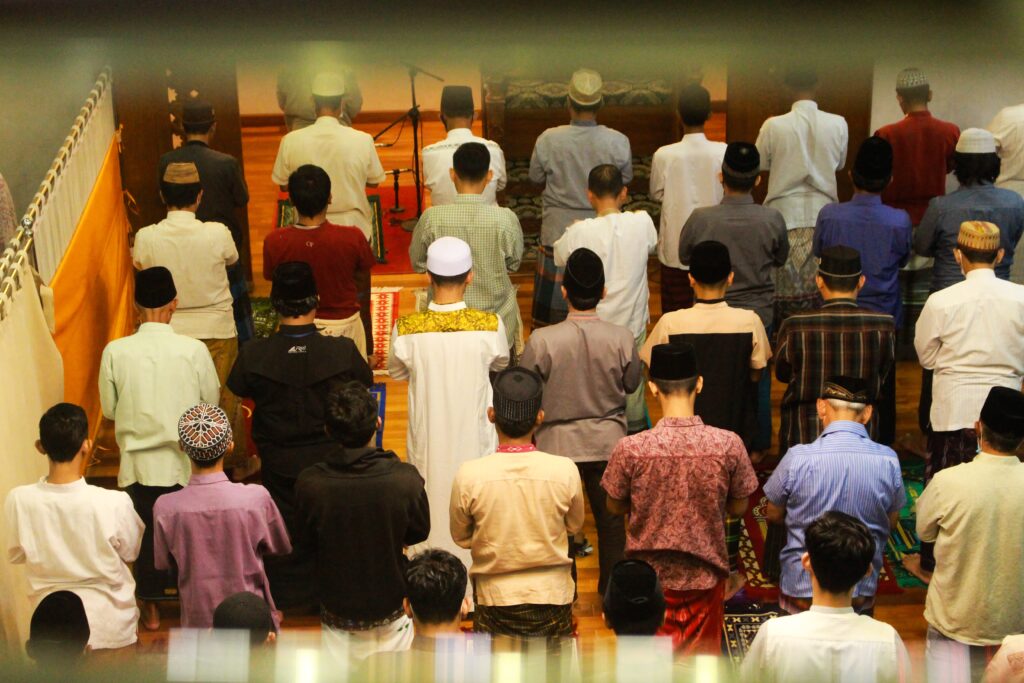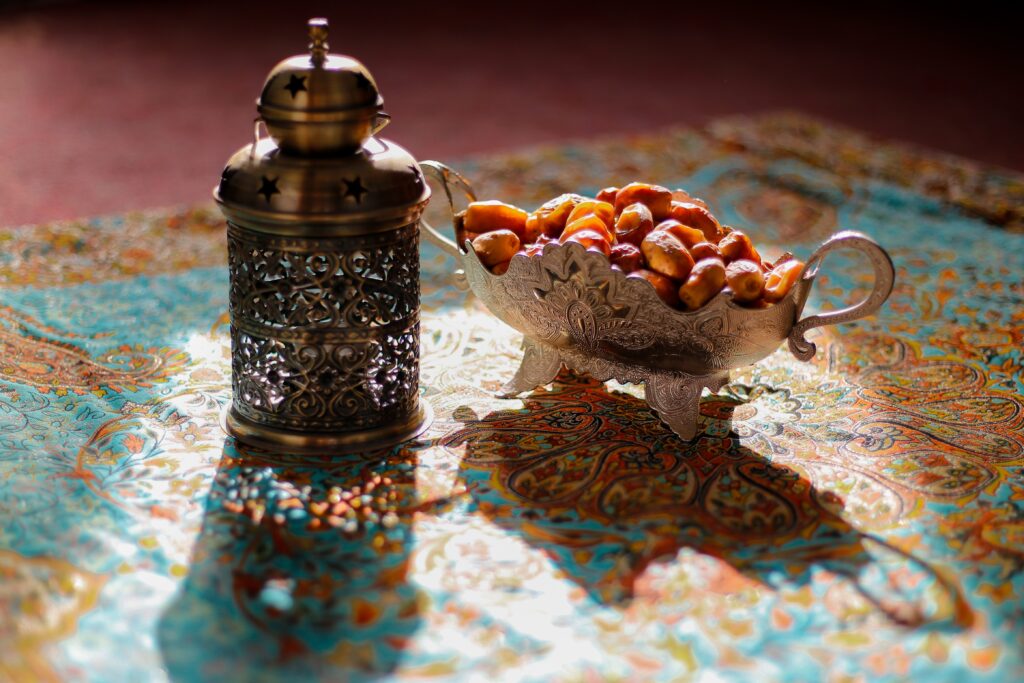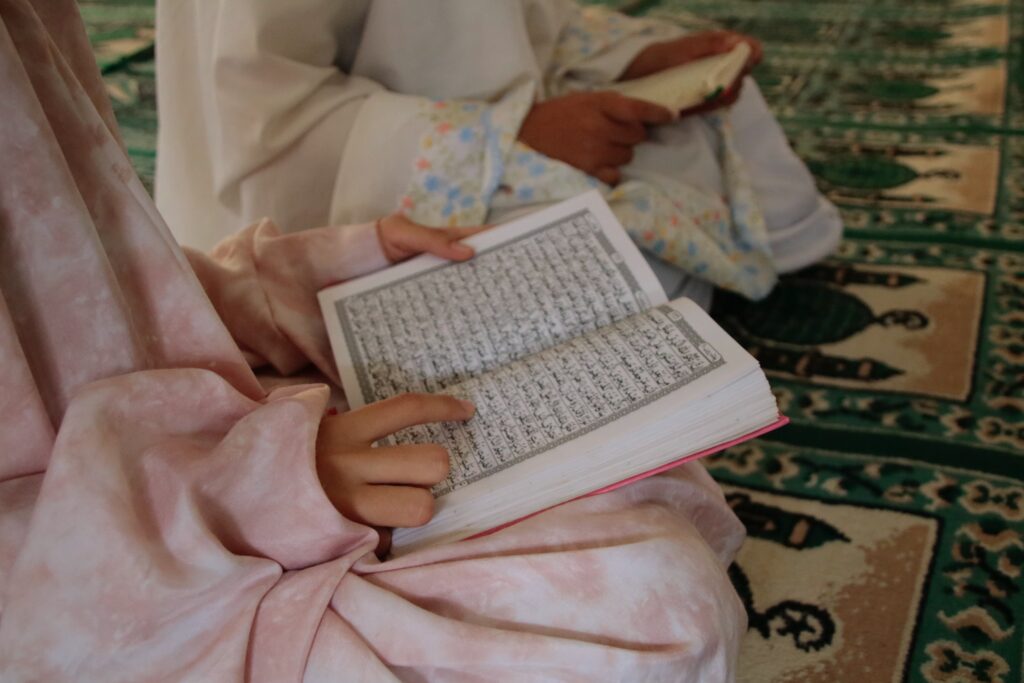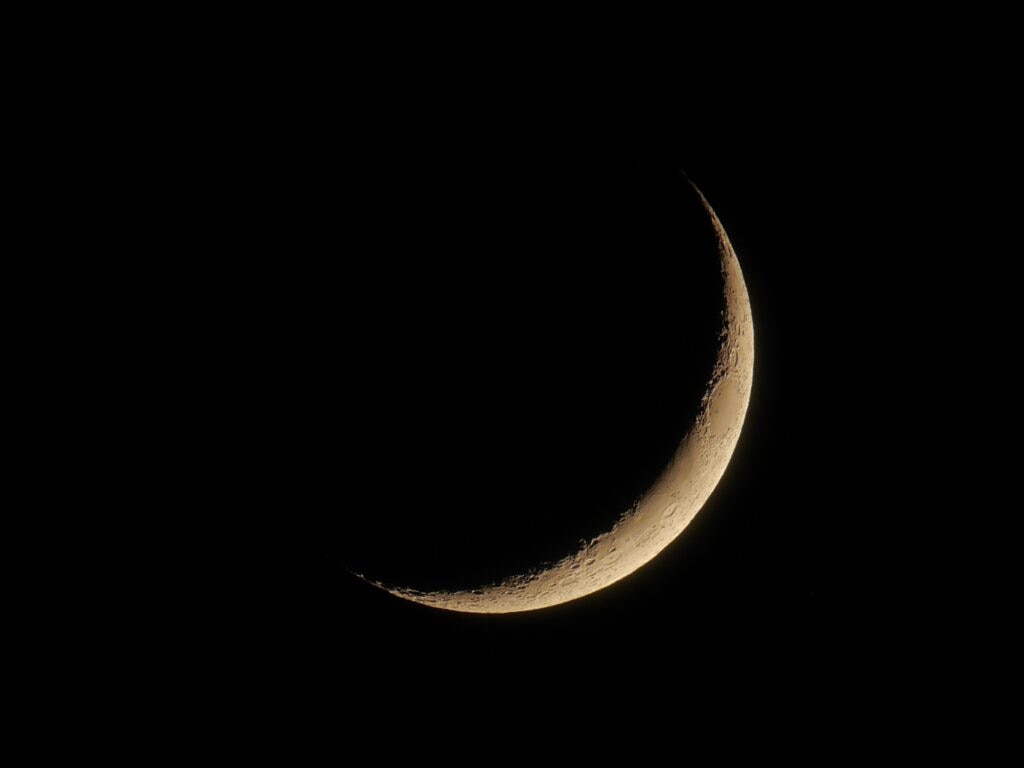Guidance regarding basic Islamic issues that Hazrat Amirul Momineen, Khalifatul Masih Vaa, has given on various occasions in his written correspondence and during MTA programmes is being published officially below for everyone’s benefit.
Concealing or publicising good deeds

A missionary […] wrote to Hazrat Amirul Momineen, Khalifatul Masih Vaa, enquiring about concealing voluntary good deeds [nawafil] from people. He expressed that he was not seeking a formal religious edict, or fatwa, but rather desired the personal viewpoint of Huzooraa. Huzoor-e-Anwaraa, in his letter dated 11 May 2022, provided the following response to his query:
“A fundamental point here is that you, despite being a missionary of the Community, have asked me for my personal opinion rather than a religious ruling, or fatwa. I will certainly only say what is correct and aligns with Islamic teachings. It will not merely reflect my personal views but will accord with the fatwa of the Jamaat.
“As far as your question is concerned, Islam prohibits prying into others’ affairs. Therefore, no one else has the right to poke their nose into the nature of a person’s fasts undertaken for the sake of God Almighty and ask whether they are supererogatory or intended to compensate for missed obligatory fasts.
“Moreover, Islam has instructed its followers to perform good deeds both publicly and privately. Various Islamic modes of worship embody both overt and covert actions, and both kinds of righteous deeds have their unique advantages. For instance, Allah the Exalted says in the Holy Quran regarding financial sacrifices:
“‘If you give alms openly, that is indeed good, but if you give them secretly to the poor, it is even better for your own selves.’ (Surah al-Baqarah, Ch.2: V.272)
“He further states:
“‘Those who spend their wealth in the cause of Allah by night and day, secretly and openly, have their reward with their Lord; on them shall come no fear, nor shall they grieve.’ (Surah al-Baqarah, Ch.2: V.275)
“The Promised Messiahas, comparing this Quranic commandment of performing both open and hidden acts of goodness with the teachings of the Gospel and explaining its wisdom, states:
“‘Similarly, the Gospel instructs that you should not perform good deeds so that they should be seen by others. But, the Quran admonishes against concealing all your actions from others. Instead, when wisdom dictates, perform certain actions secretly when you deem it better for your soul, and display certain actions when you believe they will benefit others in general. Thus, you will have two rewards, and as a result of your actions, those weaker people who find it difficult to muster the courage to commit good acts, might be inspired to follow your example. God himself has elaborated on the wisdom of this teaching in His Word by saying سِرًّا وَّ عَلَانِيَةً. That is to say, do good works both secretly and openly. This means that not only should one counsel others verbally but encourage by example as well. Mere words are not always adequate in every situation; one’s practical example often has a greater impact on others.’ (Kashti-e-Nuh, Ruhani Khazain, Vol. 19, pp. 31-32)
“Hence, if the intent of the doer of good is pure, that is, the intention is that others may also be inspired by this open act of goodness, or if his act of goodness inadvertently becomes apparent to people, then there is no need to worry or resort to pretexts to hide this goodness. This is because the Holy Prophetsa has instructed that the reward and punishment of human actions depend upon the intent of the doer of good. (Sahih al-Bukhari, Kitab bad’i l-wahy) However, such a person should continue to pray to Allah Almighty that He protects him from Satan’s attacks, that instead of hypocrisy and ostentation, humility and submission are inculcated in him, and that his overt act of goodness also grants others the ability to perform good deeds, so that he may also partake in the rewards of their good deeds, because the Holy Prophetsa has also said:
إِنَّ الدَّالَّ عَلَى الْخَيْرِ كَفَاعِلِهِ
“‘Indeed, the one who guides others to do good deeds is like the one who does them.’ (Sunan at-Tirmidhi, Kitab al-‘ilmi ‘an rasulillahsa, Bab ma ja’a ‘ad-dal-lu ‘ala l-khayri ka fa‘ilihi’)”
Expiation [kaffarah] for intentionally breaking a fast

Someone from India wrote to Hazrat Amirul Momineen, Khalifatul Masih Vaa, recounting his various mistakes and shortcomings concerning the promises he made to God Almighty and his non-observance of Ramadan fasts. He sought guidance regarding the expiation of these mistakes and the attainment of forgiveness for these sins. […] Huzoor-e-Anwaraa, in his letter dated 11 May 2022, gave the following answer to his question:
“The errors you have mentioned, and the duties that were neglected or not fulfilled, or the intentional breaking of obligatory fasts – all these issues pertain to the rights of Allah the Exalted, and only He can forgive them. The remedy for these lies in genuine repentance before Allah and continually seeking His forgiveness for one’s mistakes.
“As you have written, your health is in good condition by the grace of Allah, so alongside repentance and continual seeking for forgiveness [istighfar], you should also focus on gradually making up for the unobserved fasts (i.e., those fasts of Ramadan that were not observed or were intentionally left incomplete or broken). Similarly, if you want to atone for these mistakes and shortcomings by offering a certain amount of fidyah, you should do so by way of charitable giving.
“The authority to forgive your past mistakes and shortcomings, to accept your present good deeds, your repentance, your prayers for forgiveness, and your acts of charity, lies solely with Allah the Exalted. Yet, based on the teachings of the Holy Quran, the instructions of the Holy Prophet Muhammadsa and the advice given by his most ardent devotee, the Promised Messiahas, we can only pray that Allah grants you wisdom, blesses your sincere efforts, accepts your repentance and forgiveness through His mercy, protects you from all kinds of satanic attacks in the future, and includes you amongst His devout servants. Amin.”
Fidya for menstruating women during Ramadan

Someone from Jordan asked Hazrat Amirul Momineen, Khalifatul Masih Vaa, whether a woman during her menstruation is obliged to give fidyah for not fasting. If some fasts are missed due to any excuse, is it necessary to make them up under all circumstances, or are these fasts annulled after a certain period? For example, if a person is ill and cannot fast for two years, is it necessary to fast for all the past days after recovering? How can a pregnant or nursing woman who cannot fast during Ramadan for two years or more make up for these fasts? Huzoor-e-Anwaraa, in his letter dated 16 May 2022, provided the following guidance on this matter:
“The onset of menstruation is a natural physiological condition for women. The Holy Quran has deemed it a state of discomfort for them. (Surah al-Baqarah, Ch.2: V.223) In this state, Allah the Exalted has granted women a reprieve from all forms of worship. Utilising this dispensation granted by Allah Almighty is indeed the true act of obedience and is also reward-bearing. Therefore, making up for the fasts of Ramadan that could not be observed due to menstruation is sufficient; there is no obligation to offer a fidyah. However, if a woman has the means to give fidyah and desires to give it willingly as an additional act of virtue, there is no prohibition against this. One of the reasons for giving fidyah is also to gain the ability and opportunity to fast; as the Promised Messiahas has said, ‘Once [this question] occurred to me as to why fidya had been constituted. Then, I realised that it is so ordained to [invoke God to] create favourable circumstances [tawfiq] for one to be able to fast.’ (Al Hakam, No. 44, Vol. 6, 10 December 1902, p. 9)
“As for the fasts that are missed for some valid excuse, they must be made up later, as this is the Quranic command, as it states:
“‘Therefore, he who witnesses this month, being stationary and in health, should fast through it. But whoso is ailing, not being permanently incapacitated, or is on a journey, should complete the reckoning by fasting on a corresponding number of other days. Allah desires ease for you and desires not hardship for you; He has granted you this facility so that you should encounter no hardship in completing the reckoning, and that you may exalt Allah for His having guided you and that you may be grateful to Him.’ (Surah al-Baqarah, Ch.2: V.186)
“Therefore, it is obligatory to make up for the fasts of Ramadan after the valid excuse has ceased. But if someone becomes so afflicted that they cannot make up for these fasts even later, then Allah the Exalted has guided them towards the payment of fidyah as per their capacity, as it is stated:
“‘And for those who find fasting a strain hard to bear is an expiation, the feeding of a poor person, if they can afford it.’ (Surah al-Baqarah, Ch.2: V.186)
“Regarding the compensation for missed fasts after the justifiable reason has ceased and the payment of fidyah, the Promised Messiahas stated:
“‘Fidyah may only be contemplated in the case of a frail elder [shaykh fani] or the likes, who lack the necessary strength to ever complete a fast. Otherwise, for general people, who regain health and become capable of fasting again, the contemplation of merely offering fidyah would equate to ushering in a complete laxity in religious observance. In our view, a faith devoid of personal striving [mujahadah] holds no significance. Absolving ourselves of the responsibilities bestowed upon us by God in this way is a grave sin. Allah the Exalted has said that He will guide only those who strive in His path [Surah al-‘Ankabut, Ch.29: V.70].’ (Badr, No. 43, Vol. 6, 24 October 1907, p. 3)
“So, in essence, if some fasts of Ramadan are left due to some valid excuse, these should be made up after the excuse has ceased, and if one has the ability, fidyah may also be paid for not being able to fast during Ramadan.
“If someone permanently lacks the strength to make up for these fasts, then according to the verse لَا يُکَلِّفُ اللّٰہُ نَفۡسًا اِلَّا وُسۡعَہَا ‘Allah burdens not any soul beyond its capacity.’ (Surah al-Baqarah, Ch.2: V.287), such a person will be considered excused in the sight of Allah the Exalted. If they have the strength to pay fidyah in lieu of these fasts, then they should do so, and if they do not even possess the ability to pay fidyah, they will still be deemed excused in this matter in the sight of Allah the Exalted. The same rule will apply to pregnant and nursing women.
“If a person has missed fasts for more than one Ramadan month due to a legitimate excuse and, subsequently, Allah blesses them with the ability to fast after the removal of this excuse, they should strive to make up for these missed fasts gradually, to the best of their ability. Nevertheless, there exist divergent interpretations concerning the observance of missed fasts spanning more than one Ramadan year. Some Islamic jurists maintain that missed fasts from prior years cannot be observed in subsequent years. However, Hazrat Musleh-e-Maudra has provided different guidance on this matter. He advises:
“‘I wish to counsel the Community that those members who did not observe all the fasts of Ramadan should make them up and complete them later, regardless of whether these fasts were missed due to negligence, illness, or travel. Similarly, if they have missed any fasts in the past years due to negligence or any religiously justified excuse, they should also endeavour to complete them before standing before Allah Almighty, so they can be absolved. Some jurists hold the belief that missed fasts from the previous year cannot be observed in the following year. However, I hold a different view on this matter. If someone was unable to fast due to ignorance, then ignorance can be forgiven. However, if they intentionally chose not to fast, similar to intentionally missing a prayer, there is no option or provision to make up for it [qadha]. On the other hand, if they missed a fast due to forgetfulness or an error in legal reasoning, I believe they can make it up, and it is preferable for them to do so. Yes, if they could have fasted but deliberately chose not to, then there is no qadha. When they repent, their deeds will start afresh. However, if they did not fast due to negligence, a mistake resulting from flawed reasoning, or illness, I believe that regardless of how far back these fasts date, they can still be made up.’ (Al-Fazl, No. 55, Vol. 50-51, 8 March 1961, pp. 2-3)”
Marrying the divorcee of a brother, removing a deceased person’s gold tooth, beauty parlour business
Someone from Jordan wrote to Hazrat Amirul Momineen, Khalifatul Masih Vaa, stating that the following questions had been submitted on their website:
Is it permissible to marry one’s brother’s divorcee?
If someone has got a gold tooth fitted, is it permissible to remove it after the person’s demise?
Is it permissible for women to operate beauty parlours?
Huzoor-e-Anwaraa, in his letter dated 6 June 2022, provided the following responses to these questions:
Marrying a brother’s divorcee

“Allah Almighty has stipulated in the Holy Quran, specifically in Surah an-Nisa, verses 23 to 25, the women with whom marriage is prohibited for Muslims. Among these women, no prohibition is imposed on marrying the widow or divorcee of one’s brother. Likewise, in the Hadith, the Holy Prophetsa did not prohibit marrying the widow or divorcee of a brother. Hence, it is permissible to marry the widow of a brother or, if the brother has divorced his wife and the waiting period [‘iddah] stipulated in the Holy Quran has passed, [it is also permissible to marry] such a woman. There is no prohibition in this regard.”
Removing a gold tooth from a deceased person

“If teeth made of gold or silver are not fixed and can be easily removed, then there is no issue in removing such teeth from the mouth of a deceased person. Generally, people do remove them, just as artificial dentures are usually removed from the mouth of a deceased person. However, if the teeth are fixed, such as in the case of modern implants that are attached in the mouth with screws, it becomes difficult to remove them, and there is a possibility of showing disrespect to the deceased. Therefore, such teeth should not be removed.”
Operating a beauty parlour
“Operating or working in a beauty parlour is both permissible. There is no reason for it to be impermissible from a religious perspective, provided that certain religious considerations are taken into account: there should be no mixing between men and women, the workers in the parlour should be women, and the individuals getting made up should also be women. Full provisions for purdah should be made. Makeup should be limited to the face or other parts of the body that do not lead to immodesty when beautified.”
Reciting takbirat aloud on Eid al-Fitr

A missionary from the UK asked Hazrat Amirul Momineen, Khalifatul Masih Vaa whether it is permissible to recite takbirat aloud while heading towards the site of Eid prayer or the mosque on the occasion of Eid al-Fitr too. Huzoor-e-Anwaraa, in his letter dated 8 June 2022, provided the following response to this matter:
“Recitation of takbirat is confirmed from the practice of the Holy Prophetsa on both occasions of Eid al-Fitr and Eid al-Adha. The only distinction is that Hadith substantiates that on Eid al-Adha, these takbirat are recited from after the Fajr prayer on the 9 Dhul Hijjah until after the Asr prayer on 13 Dhul Hijjah. (Sunan ad-Daraqutni, Kitab al-‘idayn, Bab 1, Hadith 1754) However, on Eid al-Fitr, the Holy Prophetsa and his companions would habitually commence the recitation of takbirat upon leaving their homes for the Eid prayer in the morning, and this would continue until the commencement of the Eid prayer. However, takbirat were not recited after the Eid prayer (Musannaf Ibn Abi Shaybah, Kitab salati l-‘idayn, Bab at-takbiri ‘idha kharaja ila l-‘id). This is our practice too, and for this reason, I issued a circular a while ago reminding the members of the Jamaat that takbirat should also be recited from morning until the Eid prayer on the day of Eid al-Fitr.”
Attributing oneself to someone other than one’s father

A student […] wrote to Hazrat Amirul Momineen, Khalifatul Masih Vaa, stating that he would like to have his mother’s name, instead of his father’s, inscribed on his […] certificate, and requested permission for this. Huzoor-e-Anwaraa, in his letter dated 8 June 2022, gave the following reply to his query:
“There is no doubt that both parents play an equal role in the birth and upbringing of a child. That is why the Holy Quran ascribes the child to both the mother and father, as it states:
لَا تُضَآرَّ وَالِدَةٌۢ بِوَلَدِھَا وَلَا مَوۡلُوۡدٌ لَّہٗ بِوَلَدِہٖ
“‘No mother shall be made to suffer on account of her child, and no father shall be made to suffer on account of his child.’ (Surah al-Baqarah, Ch.2: V.234)
“This verse signifies that the child is a shared responsibility and a treasure of both parents.
“However, when it comes to addressing the child by someone’s name, the Holy Quran clearly states:
اُدۡعُوۡھُمۡ لِاٰبَآئِہِمۡ ھُوَ اَقۡسَطُ عِنۡدَ اللّٰہِ
“‘Call them after their fathers; that is most just in the sight of Allah.’ (Surah al-Ahzab, Ch.33: V.6)
“Undoubtedly, if your father did not partake in your upbringing and if he did not have any valid reason for his actions, he will be accountable in the sight of God. However, as far as worldly matters are concerned, you will be recognised as his offspring. Therefore, from a religious perspective, your father’s name should be the one to appear on your documents as a symbol of your lineage.”
(Compiled by Zaheer Ahmad Khan, Head of Records Department, Private Secretariat, London. Translated by The Weekly Al Hakam.)

